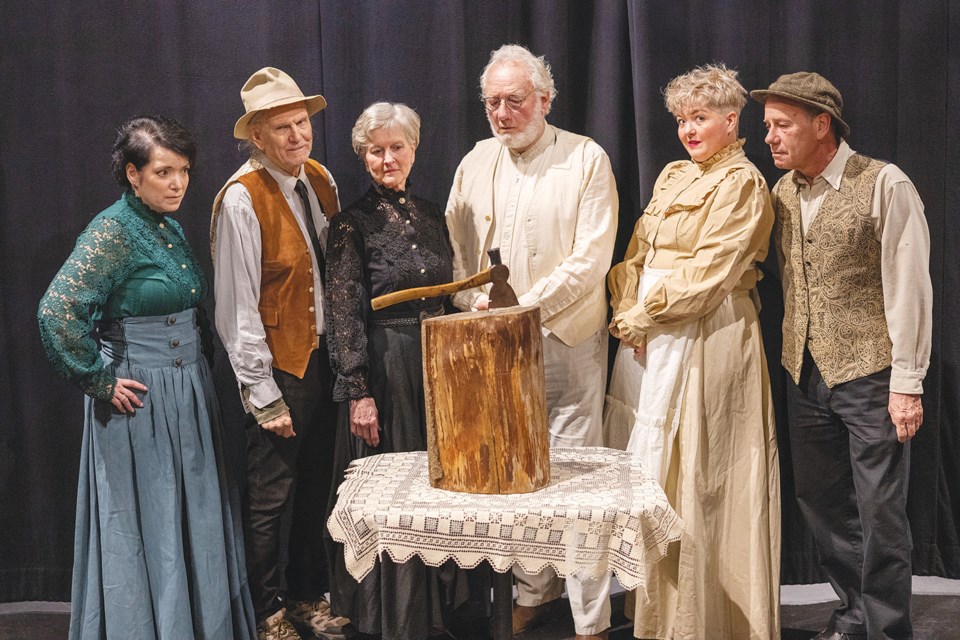Four years after COVID-19 interrupted its journey to the stage, the Driftwood Players will finally present the story of one of the 19th century’s most sensational true-crime mysteries.
Blood Relations, by Canadian dramatist Sharon Pollock, won the Governor General’s literary award in 1981. The play presents a fictionalized version of Lizzie Borden, who in 1892 was tried and acquitted of murdering her father and stepmother in Fall River, Massachusetts.
“The remarkable thing about the play is that it remains relevant as a kind of feminist manifesto about the need to defend the rights of women and to provide women with the opportunities that men had,” said Anthony Paré, director of Blood Relations. “It’s remarkably timely despite the fact that we’ve had years and years of social activism around advancing and supporting women.”
The heated events of August 1892 are framed by a retrospective conversation between Borden and an intimate friend known only as The Actress. The two (played by Driftwood newcomers Jennifer Oke and Sophia Ballantyne) swap roles when reenacting the effects of patriarchal gaslighting that leads to violence.
“Even though we have better supports in place today, our idea of what makes man and what makes woman and what makes family hasn’t changed too much until recently,” said Oke. “I saw [the play] as a really great opportunity to talk about it and bring it to the attention of people who love theatre.”
The cast’s complement of male actors — Richard Austin, Mac Dodge and Larry Musser — remains unchanged from the original production of 2019. Its four female artists are new to the ensemble. Ballantyne and Oke are joined by Melinda Oliver and Mardell Vestad, playing Lizzie’s sister and stepmother respectively.
Throughout the play, Ballantyne (as Lizzie) seethes with frustration, constrained by her aging father (played by Dodge as a phlegmatic paterfamilias) and curt stepmother (Vestad’s steely depiction oozes scorn). Musser plays her scheming brother, whose mercenary machinations spur Lizzie into action.
“It’s the type of play I really enjoy,” said Vestad. “There’s a lot of drama to it and it’s a little on the dark side.”
“I’ve always wanted to do something that’s spooky and eerie,” echoed Ballantyne. “But it’s hard to leave her [Lizzie] at home. I do find myself angrier and sadder than I normally would be in everyday life, and that’s because I think she’s sitting in me.”
Oliver, who plays Lizzie’s sister Emma with muted equanimity at the story’s outset, undergoes a subtle transformation. Increasing pressure from her parents leads to an emotional break. “She starts to stand up for herself when she gets pushed,” said Oliver.
In Pollock’s telling — and some contemporary accounts of Borden’s alleged rampage — Lizzie’s axe becomes an extreme corrective for gender inequity. The story also depicts 19th-century prejudices toward people of Irish descent, and women who refuse to conform to feminine ideals of fragility.
Austin’s version of Dr. Patrick, an Irish citizen of Fall River sympathetic to Lizzie, is the target of racial invective so commonplace it seems not to sting. Later, as a defence attorney, Austin’s character invokes similarly misguided tropes about womanly delicacy.
“He plays upon prejudices,” explained Austin. “That’s what makes it so interesting for me: the power dynamics and crossing gender lines. Dr. Patrick in particular is the only person that Lizzie finds amusing; she connects with another marginalized person. Both of my characters are on the outside looking in.”
Blood Relations will be performed at three venues: the Heritage Playhouse in Gibsons, the Sechelt Seniors Activity Centre, and the Pender Harbour Community Hall in Madeira Park. Nine shows are scheduled from March 29 to April 14. Tickets ($25) are available at driftwoodplayers.ca as well as Fong’s Market, MELOmania, Strait Music and the EarthFair Store.





